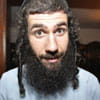 By Matthue Roth
By Matthue Roth
The average American family spends just as much time doing laundry in the present day as they did a hundred years ago, which is what Luddites will tell you when they're trying to prove to you that technology doesn't solve everything.
I don't totally believe that -- technology is pretty damn convenient for a lot of things. For instance, I can prove to my friends that the correct spelling of googol (the number) is not google in about two seconds flat, as opposed to spending three to four minutes running to the basement to get the dictionary, the good one, and looking it up. (I'm not bad with spelling, I'm slow with it.) Not to mention the ease with which I can find a recipe for just about anything.
But there's one group that technological innovation has caused a lot of problems for, and that's observant Jews. Motion sensors are a royal pain to deal with during Shabbos. In the future, when fingerprinting, voice-printing, and eyescan technology become widespread, this is going to get even more complicated. Forget hotels and apartment buildings -- what's going to happen when every new home in America is going to require an electrical connection just to open the front door?
That's not saying that new-world advances in technology and communication have been detrimental to observant Judaism. In 1949, the first kosher symbol was instituted (for Heinz vegetarian baked beans, btw). These days, there are more kosher symbols than we know what to do with, resulting in both confusion (because, really, who knows which symbols to trust, and which symbols are just put on by kosher hacks?) and trepidation (because most of us don't have time to actually call up every rabbi who plasters their stamp of approval on a can of baked beans and ask about their kashrut practices).
Meanwhile, Jews have found a way to stir up more trouble all on our own, with wholesale batches of new stringencies and unacceptable practices. Friends of ours -- actual friends -- are fond of digging through our pantry, finding a curry powder or a batch of kombu with a K surrounded in some strange parallelogram and asking, with more than a splash of skepticism, "Oh, you trust them?"
Curiously enough, if you look at the biggest change in both communication and skeptical dissent in religious communities, you'll find two web sites with overwhelmingly huge traffic numbers: Vos Iz Neias and Yeshiva World News. These sites have created a sort of self-policing news filter, reprinting mainstream news stories (from sources as varied as FOX News and PETA), sometimes with names filtered out to prevent gossip or immodest photos deleted, with which ultra-Orthodox people can reliably access "safe" internet content. Of course, the actual news stories reprinted pales next to the comments sections of these sites, which routinely run up to 500 or 1000 entries per story, in which people trade information, debate rulings of Jewish law, and call out mainstream Orthodox authorities (and each other) on inconsistencies or simply gossip about the best new kosher restaurants in a certain area. Is the internet becoming the new rabbinical authority among ultra-Orthodox Jews? Of course not. But I'd be lying if I said I didn't know tons of people who have Googled their own halachic questions (and I've used the same methodology once or twice myself).
From this group, smaller communities have begun to form, along the lines of personal blogs such as Frum Satire and "official sites" of rabbis such as Yacov Horowitz. So far, these internal communities have formed less along religious lines, and more along lines of what sorts of dialogue we're interested in. But even these sites are starting to self-impose structure, creating forums where like-minded individuals can compare notes and offer tips, and creating other forums or rooms where those who want to fight or debate, can.




